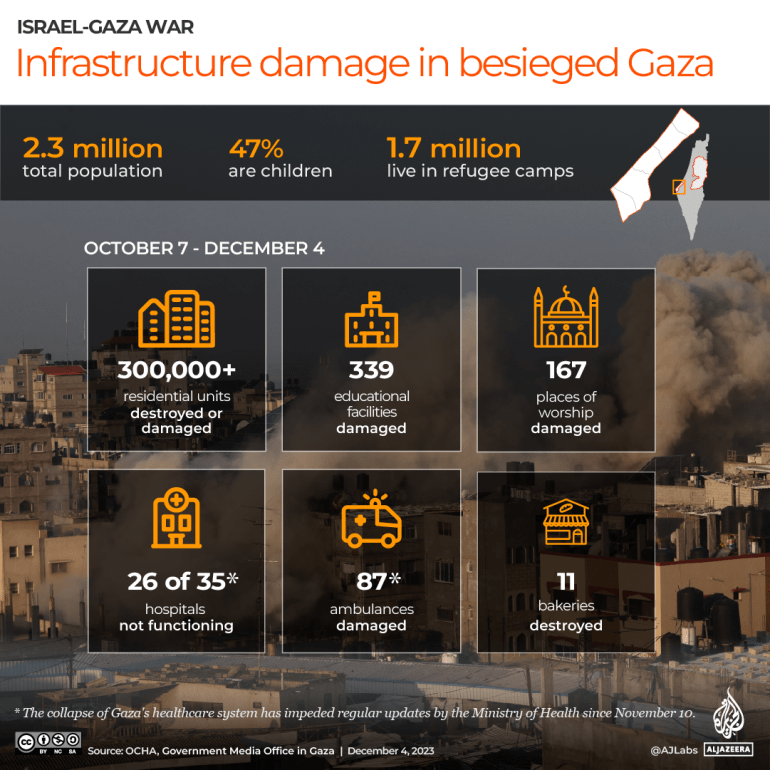The “WHO received notification” from the Israeli forces “that we should remove our supplies from our medical warehouse in southern Gaza within 24 hours, as ground operations will put it beyond use”, its chief Tedros Adhanom Ghebreyesus said in a post on X on Monday.
Today, @WHO received notification from the Israel Defense Forces that we should remove our supplies from our medical warehouse in southern Gaza within 24 hours, as ground operations will put it beyond use.
We appeal to #Israel to withdraw the order, and take every possible…
— Tedros Adhanom Ghebreyesus (@DrTedros) December 4, 2023
He appealed to Israel to withdraw the order and take measures to protect infrastructure such as hospitals.
The Israeli army snapped back on Tuesday, saying it never issued such a warning. “The truth is that we didn’t ask you to evacuate the warehouses and we also made it clear [and in writing] to the relevant UN representatives,” COGAT, the Israeli defence ministry body responsible for Palestinian civilian affairs, said on X.
“From a UN official we would expect, at least, to be more accurate,” it added.
“This is a social media row that is burning up and we can expect that it will continue to rumble on,” said Al Jazeera’s Alan Fisher, reporting from occupied East Jerusalem.
“We can see that the WHO did take this seriously to start moving stuff out of the warehouse,” our correspondent said, adding that the warehouse services 11 hospitals in southern Gaza, and there were concerns among UN officials that the removal of supplies could lead hospitals in the south to become even more overwhelmed.
“This has the possibility of growing into a bigger diplomatic row,” he noted.
The WHO, like other UN agencies, has repeatedly called on Israel to restrain its use of force to avoid targeting civilians and medical facilities in its military offensive in Gaza.
‘Nowhere is safe in Gaza’
Meanwhile, on Monday, Lynn Hastings, UN humanitarian coordinator for the Palestinian territories, warned that an “even more hellish scenario is about to unfold, one in which humanitarian operations may not be able to respond”, adding that “the conditions required to deliver aid to the people of Gaza do not exist”.
Since the end of a seven-day truce, Israeli forces have pushed into southern Gaza, “forcing tens of thousands … into increasingly compressed spaces, desperate to find food, water, shelter and safety”, Hastings said in a statement. “Nowhere is safe in Gaza and there is nowhere left to go.”
After Hamas launched an assault in southern Israel on October 7 that killed more than 1,100 people, Israel has bombarded the Gaza Strip, killing more than 15,900 Palestinians, including 6,600 children. Entire neighbourhoods have been pulverised; about 1.9 million people, more than 80 percent of the population, fled their homes.
The WHO has recorded an unprecedented number of attacks on the strip’s healthcare system, including 203 on hospitals, ambulances, medical supplies, and the detention of healthcare workers.

‘Influx of bodies’
After focusing most of its air and ground raids on northern Gaza for more than a month, the Israeli army announced over the weekend the expansion of its operations to the south following the collapse of the truce. The move spurred great concerns among health officials who fear a further deterioration of an already catastrophic humanitarian crisis.
“We are flooded with an influx of dead bodies,” Munir al-Bursh, the director general of Gaza’s Ministry of Health, told Al Jazeera on Monday, describing a collapsed healthcare system unable to cope with the needs of the population amid an acute shortage of staff and medical supplies.
Areas in the south are jammed with civilians who escaped bombardment in the north after heeding Israeli evacuation orders that indicated southern Gaza as a safe space. But as that area is now being heavily bombed and tanks are approaching the south’s main city of Khan Younis, civilians describe a great sense of fear and frustrations on where to go next.
The WHO issued a statement warning that intensifying military ground operations in Khan Younis “are likely to cut thousands off from healthcare, especially from the area’s two main hospitals, as the number of wounded and sick increases”.
In the south, thousands of people are now sheltering at the Nasser Medical Complex and another 70,000 at the 370-bed European Gaza Hospital, the UN agency estimates.
